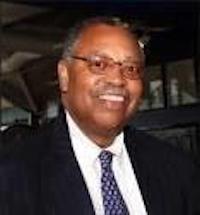
By Ravi Batra
Ireach back to scholarly remarks made in 2011 by a real legal scholar – whose views have the power of law – now-EDNY Federal District Judge William Kuntz II. Then distinguished Attorney-Bill Kuntz, as Keynote speaker celebrating Black History Month convened by NYS Office of Court Administration – explains why Birth Citizenship is embedded in our Constitution, and free of low-wattage Presidential Executive Action. We are a nation of laws, not men or women running for office and engaging in sexy mass electoral dating that is repugnant to our highest law: our Constitution.
“President Trump, who I voted for in 2016 as the American Dream had either died or become unrealizable for too many of my fellow Americans on the altar of “globalization,” beyond Ricardo’s Comparative Advantage principle in an analogue society that drives commerce, as digitalization has robbed jobs and Ricardo of geographic distance, has recently confused the Midterm electioneering with his threat of ending Birth Citizenship by Executive Order. While we are a presidential system of government, as opposed to parliamentary, we are exceptional because of Separated Powers that are untouched and un-trampled by presidential actions.
While I am against porous borders and sanctuary cities, I am all for our cherished Constitution, and having taken an Oath to defend and protect the Constitution from enemies foreign & domestic, I reach back to scholarly remarks made in 2011 by a real legal scholar – whose views have the power of law – now-EDNY Federal District Judge Dr. William F. Kuntz II. Then distinguished Attorney-Bill Kuntz, as Keynote speaker celebrating Black History Month convened by NYS Office of Court Administration – explains why Birth Citizenship is embedded in our Constitution, and free of low-wattage Presidential Executive Action. We are a nation of laws, not men or women running for office and engaging in sexy mass electoral dating that is repugnant to our highest law: our Constitution. Without protecting our Constitution, there can be no “Justice for all.” To truly enjoy Judge Kuntz’s erudite scholarship that honors the Constitution for us all, please write to him to get a copy, or email me, and I will send it. As the Editor has asked me to quote from the about 10,000-word Remarks, I do so gingerly – freely admitting that space, rather than juicy deliberative content, limits my quotations.
“The Real Debate Between Lincoln and Douglass,” starts with Professor Lino O. Graglia’s article [14 Texas Law Review of Law and Politics, pp 1-14] and his Question: “Why did he 14th Amendment to the Constitution, written in 1866 and ratified in 1868 provide birthright citizenship. As he put it, quote, “how, then, should the jurisdiction requirement of the citizenship
Clause be interpreted in regard to that question? Like any writing, or at least any law, it should be interpreted to mean what it was intended or understood to mean by those who adopted it – the ratifiers of the Fourteenth Amendment. They could not have considered the question of granting birthright Citizenship to the children of illegal aliens because, for one thing, there were no illegal aliens in 1868, when the Amendment was ratified, because there were no restrictions on immigration.” Washington Post columnist George Will agreed and wrote, “there were and had never been any illegal immigrants [up to that time] because no law ever had restricted immigration.” [IBID, PP. 5-6]
“I Found that hard to believe. And so I personally reviewed the historical Record, and indeed, at first concluded that they were, in fact, correct: No statutes enacted prior to 1868 restricted immigration to our country.”
“My efforts to solve this mystery, to understand why the 14th Amendment contains that birthright language led to me to the heart of my remarks this evening: to what I refer to as the real Lincoln-Douglass debates: Not the ones between the little judge named Stephen A. Douglass and the tall, laconic lawyer from Illinois named Abraham Lincoln… No I want to discuss the infinitely more subtle but ultimately vastly more important debate between Frederick Douglass and President Lincoln on the question of the Unity of Freedom. And In our analysis of that debate comes the answer to the question posed by the Professor and Mr. Will: Why the 14th Amendment provides unqualified citizenship to all born here when illegal immigration had not been the subject of a single statute between 1776 and end of the civil war.” Then taking a page from actor Nicholas Cage in National Treasure movie, Judge Kuntz said: “ I too found a treasure — not buried gold – but accessible text: the Declaration pointed me to the United States Constitution, and, moreover, I found in the Constitution particular clauses, clauses not often thought of as enhancing freedom but limiting it, clauses that provide the answer to the question raised by Mr. Will and the Professor.
Our starting point turned out to be Article I, Section 2 of the Constitution which provides that “representatives and direct taxes shall be apportioned among the several states which may be included within this union, according to their respective numbers, which shall be determined by adding to the whole number of free persons, including those bound to service for a term
of years, and excluding Indians not taxed, three fifths of all other persons.” … “Why is it that the same Men who seemed able only to write “all men are created equal” were quite able to use the modern sounding phrase persons? And, perhaps, above all, why on earth not mention slavery by name? The mystery deepened.
I next considered Article 1, Section 9 of the Constitution: The provision that provides, quote, “the migration or importation of such persons as any of the states now existing shall think proper to admit, shall not be prohibited by the Congress prior to the year one thousand eight hundred and eight, but a tax or duty may be imposed on such importation, not exceeding ten Dollars for each such person.”
“What is the strange reference, again to other persons? Why does this Clause limit its reach to the migration or importation of such other persons, but only to the states as are quote “now existing?” why a duty of ten dollars and why end that limitation to a duty or tax of ten dollars for each such – again gender neutral language — to 1808? What the heck is going on here?”
“What led to such extraordinary provisions? Well, the historical Record reveals that the founders, despite their personal flaws and well documented limitations knew that all people were created equal, that men and women were in fact created equal, and that as such they were all to be covered by and over time protected under our Constitution. They knew from their experiences with the British Imperial Crown, that the power to tax was the power to destroy. For them, limiting the power of the south by limiting the representational count of those other persons, the portion of the nation that did not fully empower human beings with full rights resulted in that odious 3/5ths provision.” … “the founders did it because the impetus, the power of the American call to freedom could not and would not countenance an express protection of slavery. In fact the Constitution provided the express mechanism for its extinction, for future generations to kill it by taxation after 1808 and by not extending it to newly admitted states in future generations.
And so we come to our heroes: Frederick Douglass and Abraham Lincoln….”
(Ravi Batra is a New York based attorney)





Be the first to comment